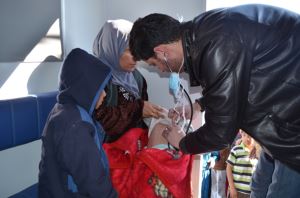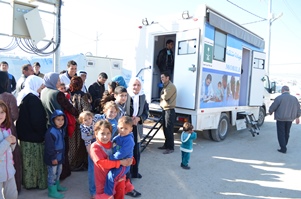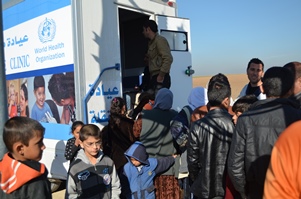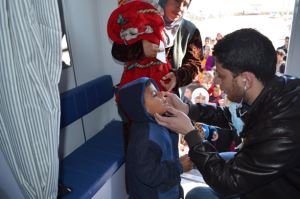 Dr Yousif Mohammed Ali examines a baby at a mobile medical clinic in Kebirto IDP camp 1. Photo credits: WHO/P Ajello7 February 2015 – In December, 2014, WHO handed over 12 mobile medical clinics to the Federal Ministry of Health of Iraq and the Ministry of Health of the Kurdistan region to support the provision of primary health care services in underserved areas housing populations in need. Funding for the clinics was provided by Saudi Arabia. The project forms part of WHO's broader objective of providing a timely basic package of primary and secondary health care services, including reproductive and mental health services, care for people with physical disabilities and patients with chronic diseases, and nutrition services.
Dr Yousif Mohammed Ali examines a baby at a mobile medical clinic in Kebirto IDP camp 1. Photo credits: WHO/P Ajello7 February 2015 – In December, 2014, WHO handed over 12 mobile medical clinics to the Federal Ministry of Health of Iraq and the Ministry of Health of the Kurdistan region to support the provision of primary health care services in underserved areas housing populations in need. Funding for the clinics was provided by Saudi Arabia. The project forms part of WHO's broader objective of providing a timely basic package of primary and secondary health care services, including reproductive and mental health services, care for people with physical disabilities and patients with chronic diseases, and nutrition services.
Four of the clinics were deployed to the Dohuk governorate, which hosts 576 846 (26%) of the internally displaced population (IDP). This has put enormous pressure on the health system and its ability to deliver health care services. The mobile clinics were donated to the governorate to ensure greater access for IDPs to health care. WHO visited one of the sites where a clinic is located and spoke to the medical team.
 Patients line up outside the clinic waiting for services. “We used to offer health services in a tent located in Kebirto IDP camp 2. Although it had adequate space, the heat was unbearable in the summer. In this new clinic we have a cool, safe and clean environment to store the required essential medicines,” said Dr Yousif Mohammed Ali, Medical Officer.
Patients line up outside the clinic waiting for services. “We used to offer health services in a tent located in Kebirto IDP camp 2. Although it had adequate space, the heat was unbearable in the summer. In this new clinic we have a cool, safe and clean environment to store the required essential medicines,” said Dr Yousif Mohammed Ali, Medical Officer.
WHO is supporting four mobile clinics in the Sumel, Shakhan, Sinjar and Zakho districts in Dohuk providing primary health care services for a large population, particularly for vulnerable groups, such as children, adolescents, women and the elderly.
In Kebirto 1 and 2 IDP camps, WHO, with funding from Saudi Arabia, sponsors a mobile clinic serving an estimated 28 000 people in the two camps alone; in which a doctor and paramedic are delivering health services for the community in the newly established camps.
 The mobile unit team provides consultations, vaccinations and temporary emergency treatment and medicines.A mobile team of health workers, supported by WHO, offer health services in two shifts; 6 days a week, 6 hours a day in different locations within the camp.
The mobile unit team provides consultations, vaccinations and temporary emergency treatment and medicines.A mobile team of health workers, supported by WHO, offer health services in two shifts; 6 days a week, 6 hours a day in different locations within the camp.
“We see an estimated 300 patients per day in the morning and afternoon shift,” Dr Yousif explains. “The common diseases that we treat in this clinic include acute respiratory infections, urinary tract infections, acute diarrhoea and noncommunicable diseases, including hypertension, diabetes, and heart and skin diseases.” The majority of people accessing health services at the clinic are children (40%), women and the elderly.
Dr Yousif noted, however, that it was difficult for the elderly to climb the stairs to get inside to access services and so they were served outside. “The space inside is also limited so doctors, patients, nurses and paramedics cannot all be in the clinic at the same time”.
The mobile clinic is the only facility serving IDPs in Kebirto 1 and 2 camps. However, plans are under way by the Directorate of Health to construct two primary health care centres, but until that happens, the clinics continue to offer health services to the 28 000 IDPs in the two camps.
 Dr Yousif examines a young girl at a mobile medical clinic in Kebirto IDP camp 1. Mobile medical clinics offer a selected range of primary care interventions, these include: routine ante and post-natal care; family planning advice and supplies; routine immunizations; diagnosis and treatment of noncommunicable diseases, such as hypertension and diabetes. The clinics in Dohuk have been operating since 22 January, 2015.
Dr Yousif examines a young girl at a mobile medical clinic in Kebirto IDP camp 1. Mobile medical clinics offer a selected range of primary care interventions, these include: routine ante and post-natal care; family planning advice and supplies; routine immunizations; diagnosis and treatment of noncommunicable diseases, such as hypertension and diabetes. The clinics in Dohuk have been operating since 22 January, 2015.
For more information, please contact:
Ms Pauline Ajello, Communications and Donor Relations | 07809288618 |
Ms Ajyal Sultany, Communications Officer| 07809269506 |








